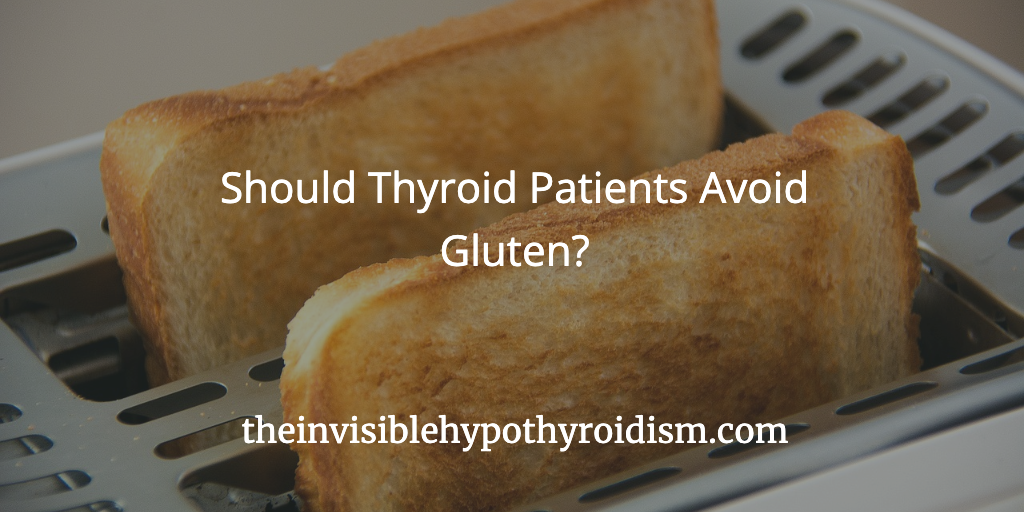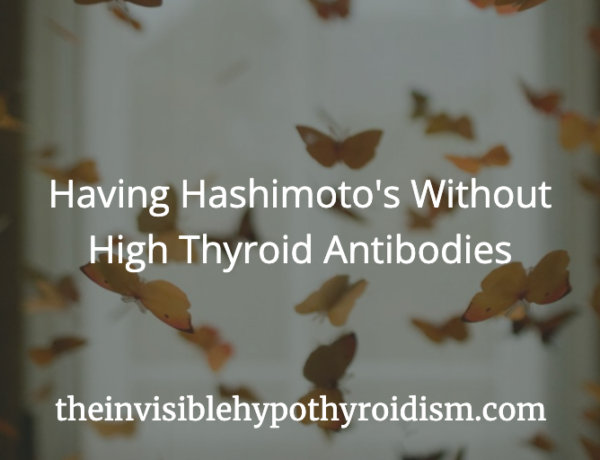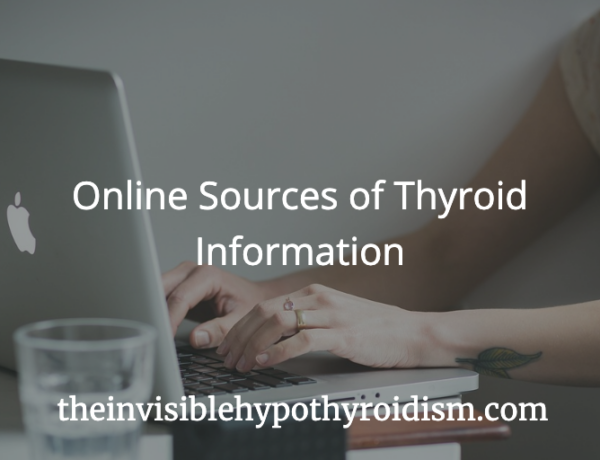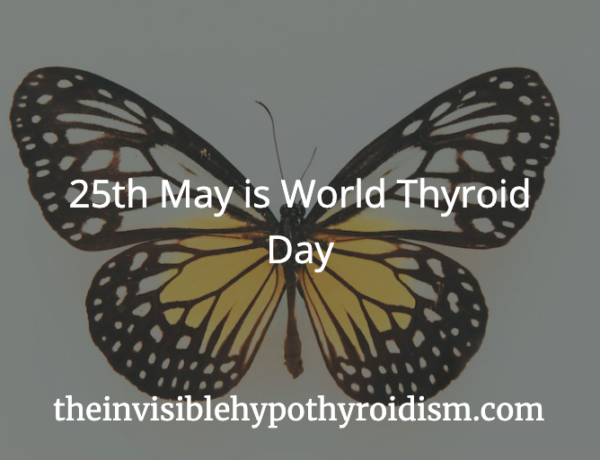Originally published on 13th September 2016 Last updated on 12th October 2023
‘Gluten-free’ is a phrase I’m sure you’ve seen a lot in the thyroid community.
If you have hypothyroidism, specifically Hashimoto’s, it’s worth knowing why so many thyroid patients report that being gluten-free helps them.
Why May Gluten Be an issue?
It is reported that around 90% of people with hypothyroidism have the autoimmune disease Hashimoto’s Thyroiditis, which attacks the thyroid gland, causing hypothyroidism. [1]
A common symptom of this autoimmune disease may be gluten sensitivity.
Did you know that you could be sensitive to gluten i.e. have it still cause you symptoms or problems, but not be Coeliac?
You could have had the tests done by your doctor to check for Coeliac Disease, and it come back negative, yet you suffer from symptoms such as:
- Fatigue
- Mood swings, Depression, Anxiety (Research and studies confirm that gluten intolerance can be linked to depression, anxiety and mood disorders)
- Brain fog
- Aches and pains
- Acid reflux
- Joint pain
- Skin complaints
- Swinging lab results and feeling hypo then hyper and vice versa
- Poor gut health / low absorption rate of nutrients
- Migraines
- Headaches
You could still be gluten sensitive.
Why?
Molecular Mimicry
One theory we see a lot is that gluten is said to trigger the same autoimmune reactions that cause you to have Hashimoto’s in the first place, since the cells of your thyroid are similar to the make up of gluten, and it confuses the body, increasing inflammation, which can mean worse or extra symptoms. However, this theory is yet to be conclusively proven or disproven.
Reducing Thyroid Antibody Levels
Worsening thyroid hormone levels over time as well as swinging test results, are thought to typically be due to the ongoing destruction of your thyroid gland, which obviously causes it to not work properly (hypothyroidism).
Lowering thyroid antibodies is believed to stop or slow this down and going gluten free is often cited to reduced thyroid antibodies and slow down or halt the attack on the thyroid gland, putting Hashimoto’s in to remission.
Other Possible Reasons
However, other possible reasons for thyroid patients feeling better on a gluten-free diet include:
- that eating naturally gluten-free usually means a reduction in processed, high sugar foods overall
- that a gluten sensitivity can lead to poor gut health, which can be indicated by a low absorption rate of minerals and vitamins. For example, low levels of B12, D, Iron etc.
Thyroid Pharmacist Izabella Wentz conducted a survey amongst thyroid patients, which showed that 86% who went gluten-free reported an improvement in digestive symptoms. Notably, only 3.5% of the respondents were actually diagnosed with coeliac disease. It could be that some of these respondents were undiagnosed Coeliac, have gluten sensitivity or, as touched on above, were just consuming a much less processed diet. [2]
When Italian researchers also put subclinically hypothyroid people with coeliac disease on a gluten-free diet for one year, thyroid function normalised in 71% of them, with another 19% normalising their thyroid antibodies. The researchers concluded that in some cases, a gluten-free diet may single-handedly reverse the abnormality. [3]
The Effect of Gluten-Free Diet on Thyroid Autoimmunity in Drug-Naive Women With Hashimoto’s Thyroiditis: A Pilot Study also concluded that their results suggested a gluten-free diet may bring clinical benefits to women with Hashimoto’s. [4]
Joint and muscle aches? Gluten-caused inflammation can cause joint and muscle pain in some people.
Joint pain and inflammation are (also) common symptoms of gluten sensitivity. And research does show links between the two diseases.
Want To See if a Gluten-Free Diet Could Help You Too?
If you think you could be sensitive to gluten, or are just interested in giving a gluten-free diet a try to see if it helps your thyroid symptoms or reduce antibody levels, then you may try eliminating it from your diet for 3-4 months and keeping a log of how you feel.
You could also retest your antibodies, TPOAB and TGAB, to see if they come down. You can order these tests online here and here.
However, there are huge benefits in screening for coeliac disease before removing gluten. For example, diagnostic tests for coeliac disease require you to be on a gluten-containing diet so that the test can detect any antibodies to gluten. If you are already on a gluten-free diet when tested for coeliac disease, you will need to reintroduce gluten for several weeks before the blood test, in order to get accurate results. Having a formal diagnosis of coeliac disease, if you have it, is also important.
Also, if coeliac disease is confirmed, as well as lifelong, strict gluten-free diet a longterm treatment plan will also need creating by your doctor and dietician to ensure you’re still getting the right nutrients from other foods. Monitoring of any intestinal damage and healing, as well as vitamin or mineral deficiencies is also recommended.
As of 2024, NICE Guidelines recommend that all autoimmune thyroid patients (those with Graves’ or Hashimoto’s) are screen for coeliac disease at diagnosis. Most people with hypothyroidism also have Hashimoto’s (as the cause) so this is important. Research shows that people with coeliac disease have a 1.5% to 3.8% chance of developing autoimmune thyroid disease, so there is a big correlation between the two conditions. If you test negative but develop possible symptoms at a later date, it is recommended you be screened again, as you can develop it at any time.
Read about the thyroid symptoms that disappeared for me after I went gluten-free.
When gluten-free, you need to avoid: gluten, wheat, malt, barley, oats (unless GF oats) and rye. Read my guide on how-to go gluten-free here.
And an important note:
As someone who personally has a history of eating disorders / disordered eating myself, I am aware that the information in this article could be triggering if you’ve previously / are currently restricting foods. Do know that I will never suggest that any of us HAVE to cut out ANY food types, so I present this info for each of us to make that decision ourselves if we still have ongoing thyroid symptoms or struggles to manage the condition.
Some people may begin removing one or two foods from their diet and enter down a slippery slope in to disordered eating behaviours, so if this is you, and you start to feel anxious about food or much of your time and energy is preoccupied with this, please seek out support from a trained professional and be cautious about altering your diet. Disordered eating needs to be taken more seriously and I don’t wish to contribute to more people struggling with this.
I’m not a fan of massively restrictive diets which can encourage disordered eating behaviours, and thus, create more stress which, in turn, isn’t great for our health either.
Conclusion
While many people with hypothyroidism and Hashimoto’s report a reduction in thyroid symptoms, less thyroid flares, better gut health, better controlled thyroid hormone levels and reduced thyroid antibodies on a gluten-free diet, and we have ideas as to why this may be the case, there is still a lot of research needing to be done in this area.
If you wish to try going gluten-free, please do be assessed for Coeliac Disease first and let your doctor know about your plans.
See my full info on the best diet with thyroid issues here.
Have you tried going gluten-free?
You can click on the hyperlinks in the above post to learn more and see references to information given, but more reading and references can also be found at:
https://www.ncbi.nlm.nih.gov/pubmed/20170845
https://onlinelibrary.wiley.com/doi/abs/10.1111/apt.12730
References:
[1] https://www.ncbi.nlm.nih.gov/pubmed/3066320
[2] https://thyroidpharmacist.com/articles/top-9-takeaways-from-2232-people-with-hashimotos/
[3] https://www.ncbi.nlm.nih.gov/pubmed/11280546
[4] https://www.thieme-connect.de/products/ejournals/pdf/10.1055/a-0653-7108.pdf






